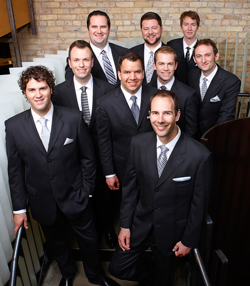by Timothy Robson

The title of Cantus’s program was “A Place for Us,” taken from a phrase in Stephen Sondheim & Leonard Bernstein’s song “Somewhere” in West Side Story. Spoken narrative linked the individual numbers together with poetry and excerpts from prose works expressing the experience of home, and how we know that a place is home to us.
An abbreviated version of “Somewhere” opened the concert, which was followed by the traditional Protestant hymn “This is my song” sung to the main theme from Jean Sibelius’s Finlandia. Cantus member Chris Foss’s complex arrangement of a traditional fiddle song followed, using jazz scat syllables to depict a country fiddler going at it.
Other notable moments in the first half of the program included a setting of the Lakota song “Sakota Wiyanki”, which featured whispers and other extended vocal techniques; William Billings’s paraphrase of Psalm 137, “Anthem: Lament Over Boston”; and a remarkable arrangement of Dave Matthews’s song “Gravedigger,” about loss and physical death (“Gravedigger, when you dig my grave could you make it shallow so I can feel the rain?”) Beginning very simply, with a single voice, the counterpoint and texture became increasingly complex through the stanzas.
Cantus performed a newly-commissioned work, Psalm of the Soil, by Sarah Kirkland Snider to an original text by Nathaniel Bellows. The music was fragmentary, with overlapping phrases and deconstructed text, making many of the words incomprehensible, even with the poem printed in the program. The music was complex and harmonically challenging. Cantus gave what appeared to be an excellent and committed performance; but for all their efforts, it wasn’t a very interesting piece, at least on a single hearing.
The traditional Appalachian song “Pretty Saro” was accompanied by an acoustic guitar, with the group deployed in several small groups across the stage, beginning with a solo voice, then a duet, and with several voices over a vocal “drone” below the vocal melodies. “Pretty Saro” was sung in quasi-southern American dialect. This particular work brought into focus a situation that occurred throughout the concert: that of performance practice of these folk and traditional songs.
Cantus’s exquisite ensemble and vocal production, very much in the European classical choral tradition, sometimes worked against the rugged nature of some of the music, for instance in the Billings anthem. Beautiful as the performance was, it seemed almost too nice. In the songs where Cantus let themselves go (such as “Pretty Saro”) the effect was much more honest. The shape-note song “Northport”, sung to the text, “I want to live in paradise, Glory Hallelujah!”) was just too pretty. It is a performance decision that all vocal groups performing this literature have to grapple with; Cantus made a choice. It would be churlish to argue about it, but their performance might have been even more striking with greater contrast in performance styles.
During their residency in Akron, Cantus worked with the choirs of Coventry High School and Firestone High School. At the beginning of the second half of the program, students from the two schools took the stage to give an excellent performance of Franz Biebl’s famous setting of “Ave Maria,” with the men of Cantus taking the part for the small second chorus. The combined ensemble sang with clear, light tone, in tune, with excellent diction.
When Cantus’s own program resumed, they opened with an intriguing arrangement of a traditional Hawaiian song, “Hole Waimea”, which was configured to trace the influence of westerners on Hawaiian music. The tune was sung first in unison, with each succeeding version more westernized, until the final stanza in block chordal harmony that would have been unknown to the historical Hawaiians.
Paul John Rudoi’s “America Will Be!”, a setting of Langston Hughes’s poem, was effective in contrasting the patriotic fervor of the main text with the parenthetical interjections of a soloist or small group, that “There’s never been equality for me, / Nor freedom in this ‘homeland of the free.’”
Two well-known songs completed the program: a beautiful arrangement of “Simple Gifts,” made for Cantus by Stephen Caracciolo, and an extended performance of Bernstein’s “Somewhere.” The latter made a fine effect, although some in the audience jumped the gun and applauded before the last phrase ended, thus spoiling a lovely moment.
After very enthusiastic applause, Cantus returned to the stage for an encore, a serene arrangement of Stephen Foster’s “Hard Times Come Again No More,” thus bringing to conclusion a worthwhile evening of interesting programming, well-performed.
Published on ClevelandClassical.com September 30, 2013
Click here for a printable version of this article.



